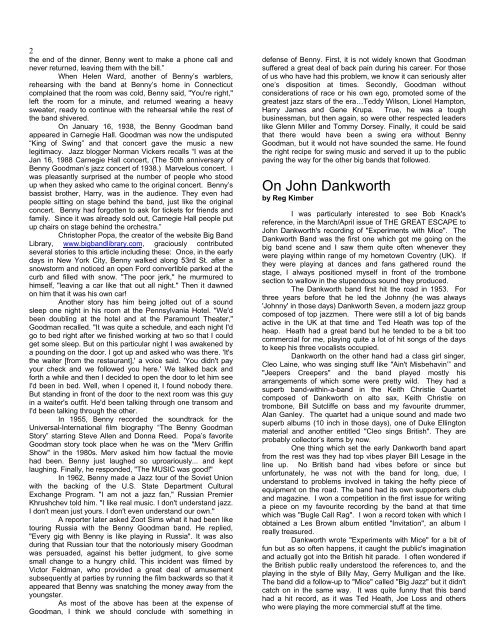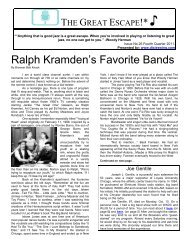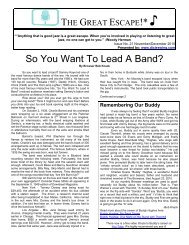Those Benny Goodman Stories - Bob Knack
Those Benny Goodman Stories - Bob Knack
Those Benny Goodman Stories - Bob Knack
Create successful ePaper yourself
Turn your PDF publications into a flip-book with our unique Google optimized e-Paper software.
2<br />
the end of the dinner, <strong>Benny</strong> went to make a phone call and<br />
never returned, leaving them with the bill.”<br />
When Helen Ward, another of <strong>Benny</strong>’s warblers,<br />
rehearsing with the band at <strong>Benny</strong>’s home in Connecticut<br />
complained that the room was cold, <strong>Benny</strong> said, "You're right,"<br />
left the room for a minute, and returned wearing a heavy<br />
sweater, ready to continue with the rehearsal while the rest of<br />
the band shivered.<br />
On January 16, 1938, the <strong>Benny</strong> <strong>Goodman</strong> band<br />
appeared in Carnegie Hall. <strong>Goodman</strong> was now the undisputed<br />
“King of Swing” and that concert gave the music a new<br />
legitimacy. Jazz blogger Norman Vickers recalls “I was at the<br />
Jan 16, 1988 Carnegie Hall concert, (The 50th anniversary of<br />
<strong>Benny</strong> <strong>Goodman</strong>’s jazz concert of 1938.) Marvelous concert. I<br />
was pleasantly surprised at the number of people who stood<br />
up when they asked who came to the original concert. <strong>Benny</strong>’s<br />
bassist brother, Harry, was in the audience. They even had<br />
people sitting on stage behind the band, just like the original<br />
concert. <strong>Benny</strong> had forgotten to ask for tickets for friends and<br />
family. Since it was already sold out, Carnegie Hall people put<br />
up chairs on stage behind the orchestra.”<br />
Christopher Popa, the creator of the website Big Band<br />
Library, www.bigbandlibrary.com, graciously contributed<br />
several stories to this article including these: Once, in the early<br />
days in New York City, <strong>Benny</strong> walked along 53rd St. after a<br />
snowstorm and noticed an open Ford convertible parked at the<br />
curb and filled with snow. "The poor jerk," he murmured to<br />
himself, "leaving a car like that out all night." Then it dawned<br />
on him that it was his own car!<br />
Another story has him being jolted out of a sound<br />
sleep one night in his room at the Pennsylvania Hotel. "We'd<br />
been doubling at the hotel and at the Paramount Theater,"<br />
<strong>Goodman</strong> recalled. "It was quite a schedule, and each night I'd<br />
go to bed right after we finished working at two so that I could<br />
get some sleep. But on this particular night I was awakened by<br />
a pounding on the door. I got up and asked who was there. 'It's<br />
the waiter [from the restaurant],' a voice said. 'You didn't pay<br />
your check and we followed you here.' We talked back and<br />
forth a while and then I decided to open the door to let him see<br />
I'd been in bed. Well, when I opened it, I found nobody there.<br />
But standing in front of the door to the next room was this guy<br />
in a waiter's outfit. He'd been talking through one transom and<br />
I'd been talking through the other.<br />
In 1955, <strong>Benny</strong> recorded the soundtrack for the<br />
Universal-International film biography “The <strong>Benny</strong> <strong>Goodman</strong><br />
Story” starring Steve Allen and Donna Reed. Popa’s favorite<br />
<strong>Goodman</strong> story took place when he was on the "Merv Griffin<br />
Show" in the 1980s. Merv asked him how factual the movie<br />
had been. <strong>Benny</strong> just laughed so uproariously... and kept<br />
laughing. Finally, he responded, "The MUSIC was good!"<br />
In 1962, <strong>Benny</strong> made a Jazz tour of the Soviet Union<br />
with the backing of the U.S. State Department Cultural<br />
Exchange Program. "I am not a jazz fan," Russian Premier<br />
Khrushchev told him. "I like real music. I don't understand jazz.<br />
I don't mean just yours. I don't even understand our own."<br />
A reporter later asked Zoot Sims what it had been like<br />
touring Russia with the <strong>Benny</strong> <strong>Goodman</strong> band. He replied,<br />
"Every gig with <strong>Benny</strong> is like playing in Russia". It was also<br />
during that Russian tour that the notoriously misery <strong>Goodman</strong><br />
was persuaded, against his better judgment, to give some<br />
small change to a hungry child. This incident was filmed by<br />
Victor Feldman, who provided a great deal of amusement<br />
subsequently at parties by running the film backwards so that it<br />
appeared that <strong>Benny</strong> was snatching the money away from the<br />
youngster.<br />
As most of the above has been at the expense of<br />
<strong>Goodman</strong>, I think we should conclude with something in<br />
defense of <strong>Benny</strong>. First, it is not widely known that <strong>Goodman</strong><br />
suffered a great deal of back pain during his career. For those<br />
of us who have had this problem, we know it can seriously alter<br />
one’s disposition at times. Secondly, <strong>Goodman</strong> without<br />
considerations of race or his own ego, promoted some of the<br />
greatest jazz stars of the era…Teddy Wilson, Lionel Hampton,<br />
Harry James and Gene Krupa. True, he was a tough<br />
businessman, but then again, so were other respected leaders<br />
like Glenn Miller and Tommy Dorsey. Finally, it could be said<br />
that there would have been a swing era without <strong>Benny</strong><br />
<strong>Goodman</strong>, but it would not have sounded the same. He found<br />
the right recipe for swing music and served it up to the public<br />
paving the way for the other big bands that followed.<br />
On John Dankworth<br />
by Reg Kimber<br />
I was particularly interested to see <strong>Bob</strong> <strong>Knack</strong>'s<br />
reference, in the March/April issue of THE GREAT ESCAPE to<br />
John Dankworth's recording of "Experiments with Mice". The<br />
Dankworth Band was the first one which got me going on the<br />
big band scene and I saw them quite often whenever they<br />
were playing within range of my hometown Coventry (UK). If<br />
they were playing at dances and fans gathered round the<br />
stage, I always positioned myself in front of the trombone<br />
section to wallow in the stupendous sound they produced.<br />
The Dankworth band first hit the road in 1953. For<br />
three years before that he led the Johnny (he was always<br />
'Johnny' in those days) Dankworth Seven, a modern jazz group<br />
composed of top jazzmen. There were still a lot of big bands<br />
active in the UK at that time and Ted Heath was top of the<br />
heap. Heath had a great band but he tended to be a bit too<br />
commercial for me, playing quite a lot of hit songs of the days<br />
to keep his three vocalists occupied.<br />
Dankworth on the other hand had a class girl singer,<br />
Cleo Laine, who was singing stuff like "Ain't Misbehavin’” and<br />
"Jeepers Creepers" and the band played mostly his<br />
arrangements of which some were pretty wild. They had a<br />
superb band-within-a-band in the Keith Christie Quartet<br />
composed of Dankworth on alto sax, Keith Christie on<br />
trombone, Bill Sutcliffe on bass and my favourite drummer,<br />
Alan Ganley. The quartet had a unique sound and made two<br />
superb albums (10 inch in those days), one of Duke Ellington<br />
material and another entitled "Cleo sings British". They are<br />
probably collector’s items by now.<br />
One thing which set the early Dankworth band apart<br />
from the rest was they had top vibes player Bill Lesage in the<br />
line up. No British band had vibes before or since but<br />
unfortunately, he was not with the band for long, due, I<br />
understand to problems involved in taking the hefty piece of<br />
equipment on the road. The band had its own supporters club<br />
and magazine. I won a competition in the first issue for writing<br />
a piece on my favourite recording by the band at that time<br />
which was "Bugle Call Rag". I won a record token with which I<br />
obtained a Les Brown album entitled "Invitation", an album I<br />
really treasured.<br />
Dankworth wrote "Experiments with Mice" for a bit of<br />
fun but as so often happens, it caught the public's imagination<br />
and actually got into the British hit parade. I often wondered if<br />
the British public really understood the references to, and the<br />
playing in the style of Billy May, Gerry Mulligan and the like.<br />
The band did a follow-up to "Mice" called "Big Jazz" but it didn't<br />
catch on in the same way. It was quite funny that this band<br />
had a hit record, as it was Ted Heath, Joe Loss and others<br />
who were playing the more commercial stuff at the time.




